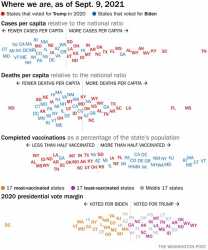[176 / 1 / ?]
https://www.washingtonpost.com/politics/2021/09/10/inescapable-overlap-pandemic-politics/
There are three reasons that Florida has consistently been a focal point of debate over the course of the pandemic. One is that its governor, Ron DeSantis, is a prominent Republican official, a role that he embraces and elevates. Another is that DeSantis has been explicit in expressing his opposition to measures aimed at containing the coronavirus or limiting its spread. A third is that, particularly of late, his state has been hit particularly hard by the virus.
Since the fourth surge in new cases began in late June, about 54,000 more people have died of covid-19. Nearly 1 in 5 of those deaths have occurred in Florida — 18 percent of the deaths come from a state that makes up about 6 percent of the country’s population. What’s more, over the course of the surge, the percentage of deaths occurring in Florida has been increasing.
It’s only natural to wonder whether DeSantis’s approach to the pandemic overlaps with the effects of the disease in his state. Is it about his leadership? Is it a coincidence, a function of the delta variant emerging as the South experiences a spike in cases thanks to people moving indoors for the summer? Is it because his state has a large population of Republicans who are less likely to have been vaccinated? A combination of those factors? Something else?
Answering these questions is tricky. It is also fundamentally unimportant. Even without a clear answer, it’s obvious that there’s an overlap of vaccination rates, party identity and pandemic outcomes that intertwines the discussion about the pandemic with partisan politics. It is inescapably the case that, even if party doesn’t play a significant role in pandemic outcomes, the debate is largely framed through a partisan lens anyway — often to a hyperbolic degree.
There are three reasons that Florida has consistently been a focal point of debate over the course of the pandemic. One is that its governor, Ron DeSantis, is a prominent Republican official, a role that he embraces and elevates. Another is that DeSantis has been explicit in expressing his opposition to measures aimed at containing the coronavirus or limiting its spread. A third is that, particularly of late, his state has been hit particularly hard by the virus.
Since the fourth surge in new cases began in late June, about 54,000 more people have died of covid-19. Nearly 1 in 5 of those deaths have occurred in Florida — 18 percent of the deaths come from a state that makes up about 6 percent of the country’s population. What’s more, over the course of the surge, the percentage of deaths occurring in Florida has been increasing.
It’s only natural to wonder whether DeSantis’s approach to the pandemic overlaps with the effects of the disease in his state. Is it about his leadership? Is it a coincidence, a function of the delta variant emerging as the South experiences a spike in cases thanks to people moving indoors for the summer? Is it because his state has a large population of Republicans who are less likely to have been vaccinated? A combination of those factors? Something else?
Answering these questions is tricky. It is also fundamentally unimportant. Even without a clear answer, it’s obvious that there’s an overlap of vaccination rates, party identity and pandemic outcomes that intertwines the discussion about the pandemic with partisan politics. It is inescapably the case that, even if party doesn’t play a significant role in pandemic outcomes, the debate is largely framed through a partisan lens anyway — often to a hyperbolic degree.

